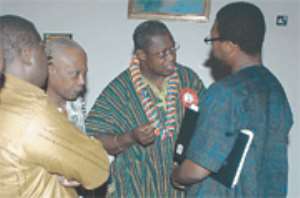
The Immediate Past Director-General of the Ghana Health Service (GHS), Prof Agyeman Badu Akosa, has stated that the failure of the government to fund research work in the universities and other research institutions is the cause of the country's under-development.
He said researchers needed to conduct research to come out with solutions to the nation's socio-economic needs but expressed regret at the fact that all the researchers in the various public universities in the country lacked funds to conduct research, saying that "they are just receiving salary".
Prof Akosa was delivering a paper on, "The House (Ghana) That Nkrumah Built” at the fifth International Conference on Osagyefo Dr Kwame Nkrumah and Awards 2007 in Accra.
Held on the theme: "Ghana @ 50: Nkrumah Lives on", the conference was organised by the West Africa International Magazine, in collaboration with the Nkrumah-Vision-Alive Movement.
Deserving Nkrumahists in Ghana and Nigeria and Pan Africanists were given various awards for their contribution towards the cause of Africa.
Prof. Akosa said on assumption of office in 1957, Dr Nkrumah set up research institutions and supported researchers in the various public universities to conduct research.
However, he said, after his overthrow in 1966, successive governments had relegated research to the background.
Prof. Akosa said the government allocated insignificant amounts for research work, which he felt was misplaced.
He stressed that the development of every country or company depended on the amount of research it conducted to give it an insight into the future.
For instance, Prof. Akosa said, companies spent 15 per cent of their earnings on research and wondered why the government was reluctant to fund research work.
"A country which is not looking into the future with research cannot develop,” he stressed.
He slammed the government's development programmes, describing them as not being inclusive, since they did not embody the poor in society, adding that Ghanaians were at the heart of Dr Nkrumah's development agenda.
He recalled that the preamble to Dr Nkrumah's Seven-Year Development Programme said by the end of the programme, no Ghanaian should be in need of food, shelter or education.
However, Prof. Akosa said, current development programmes did not cater for the needs of the poor in society, which had resulted in a drop out rate of about 42 per cent at the primary level in the country.
He said some of the drop outs ended up as criminals who visited mayhem on society.
He, therefore, urged the government to involve all citizens in planning the development agenda of the country, stressing that "those who fall out will haunt the country".
Prof. Akosa blamed Nkrumahists for allowing an "unbridled vilification of Dr Nkrumah” and asked them to try to put the records right.
He indicated that attempts to credit some individuals for gaining Independence for Ghana were wrong, since it was Dr Nkrumah who led the independence struggle and won it for the nation, saying, "Let us give praise where praise is due."
The Editor-in-Chief and Chief Executive Officer of the West Africa International Magazine, Dr Dee Otibu-Asare, described Nkrumah as a visionary, an achiever, a Pan-Africanist and a charismatic leader who championed the cause of Ghana and Africa.
He said Dr Nkrumah set out to industrialise Ghana to serve as a guide to other African countries but successive governments had dismantled all the structures which he had put up.
A former Nigerian Minister of Education, Prof. Nora Chinwe Obaji, who spoke on, "The Role of Women in Africa's Sustainable Development", said most development plans and policies in Africa were "gender blind", while women's access to loans and other credit facilities for agricultural improvement had been constrained by their inability to own land.
Dr M. N. Tetteh, a renowned scientist, who chaired the ceremony, said despite the military interruptions in Ghana, "our nation is still solid.
Story by Musah Yahaya Jafaru




 Akufo-Addo commissions Phase II of Kaleo solar power plant
Akufo-Addo commissions Phase II of Kaleo solar power plant
 NDC panics over Bawumia’s visit to Pope Francis
NDC panics over Bawumia’s visit to Pope Francis
 EC blasts Mahama over “false” claims on recruitment of Returning Officers
EC blasts Mahama over “false” claims on recruitment of Returning Officers
 Lands Minister gives ultimatum to Future Global Resources to revamp Prestea/Bogo...
Lands Minister gives ultimatum to Future Global Resources to revamp Prestea/Bogo...
 Wa Naa appeals to Akufo-Addo to audit state lands in Wa
Wa Naa appeals to Akufo-Addo to audit state lands in Wa
 Prof Opoku-Agyemang misunderstood Bawumia’s ‘driver mate’ analogy – Miracles Abo...
Prof Opoku-Agyemang misunderstood Bawumia’s ‘driver mate’ analogy – Miracles Abo...
 EU confident Ghana will not sign Anti-LGBTQI Bill
EU confident Ghana will not sign Anti-LGBTQI Bill
 Suspend implementation of Planting for Food and Jobs for 2024 - Stakeholders
Suspend implementation of Planting for Food and Jobs for 2024 - Stakeholders
 Tema West Municipal Assembly gets Ghana's First Female Aircraft Marshaller as ne...
Tema West Municipal Assembly gets Ghana's First Female Aircraft Marshaller as ne...
 Dumsor is affecting us double, release timetable – Disability Federation to ECG
Dumsor is affecting us double, release timetable – Disability Federation to ECG
